Let’s face it — customer service is hard.
You want to delight your customers, solve their problems, and meet their needs. But sometimes, things don’t go according to plan. Sometimes, you face challenges and end up with unhappy customers. And that can hurt your business in many ways.
You wonder:
“How do I deal with such a situation?”
“How do I recover from a bad customer service incident?“
“How do I apologize, compensate, and rebuild my relationships?”
“How do I prevent it from happening again?”
Customer service extends beyond mere problem-solving. It involves a proactive approach, anticipating and surpassing customer expectations.
In this blog, we’ll teach you what customer service is, why it matters, and the top trends in 2025 that will give you an edge over your competitors.
What is Customer Service?
Customer service is the support you offer customers before, during, and after they use your products or services. It is how you connect with your customers and make them feel valued, understood, and satisfied.
Great customer service is the key to building long-term relationships. It is also the way you distinguish yourself from your competitors and stand out in a saturated market.
To provide excellent service to your customers, you need to:
- Understand their needs and expectations
- Communicate clearly and effectively on multiple channels
- Provide timely and proactive support
- Follow up and ask for feedback
- Show appreciation and recognition
What is the Importance of Customer Service?
Customer service is more than just answering questions and solving problems. It is a key factor that influences loyalty, retention, and revenue.
Customer service matters to 90% of customers when choosing and sticking with a brand.
Here’s why–
- Customers who receive excellent service are more likely to trust your business and recommend it to others.
- Retaining existing customers increases their lifetime value. This also lowers your acquisition costs and increases your profit margins.
- You can create memorable experiences that foster customer loyalty by providing personalized and proactive service.
Remember, customer service is not optional!
It is a strategic asset that can help you grow your business. Investing in it can help transform your customers into strong brand advocates.
6 Elements of Exceptional Customer Service
Customer service can help you differentiate your brand, retain your customers, and grow your revenue. To provide exceptional customer service, you need to master the following elements.
1. Empathy
When you show empathy in customer service, you make your customers feel heard, valued, and respected. Here are some ways to be empathetic toward customers –
- Use positive and supportive language. Avoid using words that might sound harsh, rude, or dismissive.
Example: Instead of saying, “That’s not possible,” say, “Let me see what I can do for you.”
- Express genuine interest and curiosity. Ask open-ended questions to learn more about your customers’ needs, goals, and preferences.
Example: Instead of saying, “What do you want?” say, “How can I help you today?”
- Relate to your customers by telling them about similar situations you or others have experienced. This makes them confident about your capabilities to solve their problems.
Read More: Importance of Empathy in Customer Service
2. Customer-Centricity
| “Customer centricity is a strategy that aligns a company’s development and delivery of its products and services with the current and future needs of a select set of customers in order to maximize their long-term financial value to the firm.” – Peter Fader, Professor of Marketing, Wharton University. |
Your customers are your topmost priority. To put their needs first, you need to understand their challenges, expectations, and preferences. It also means aligning your processes, policies, and culture with their values and feedback.
Here’s how you can accomplish this
- Be proactive and flexible in finding solutions. Explore different possibilities and offer alternatives or workarounds when needed.
- Go the extra mile and exceed expectations. Avoid staying within the limitations of what is expected and surprise customers with your service quality and value.
- Communicate and collaborate with the management to deal with sensitive customer issues. Suggest improvements or changes based on customer feedback.
Read More: 10 Ways to Build Customer Centric Organization
3. Responsiveness
Responding quickly and effectively to inquiries, complaints, and feedback shows that you care about customers. It helps you build trust, loyalty, and satisfaction among customers, which can lead to referrals and repeat business.
Here are some ways to be more responsive to your customers
- Set clear expectations for response times and follow through on them. For example, if you promise to reply to an email within 24 hours, make sure you do so.
- Use multiple channels, such as phone calls, emails, live chat, social media, and text messages, to communicate with your customers.
- Keep customers informed and engaged with proactive updates and follow-ups. For example, you can send confirmation emails, tracking numbers, delivery notifications, and thank-you notes to your consumers after they make a purchase or request a service.
4. Transparency
74% of Gen Z consumers consider transparency to be of utmost importance to them.
Customers want to know the status of their issues, requests, and feedback. They don’t want to be left in the dark or feel like they’re being lied to.
Transparency means being honest, clear, and consistent with your customers about what you can and can’t do, what you’re doing, and why you’re doing it.
However, when it comes to sensitive customer issues, it’s not easy to say –
“No, we haven’t found a solution to your problem yet.”
So, how to be transparent without frustrating your customers or losing them? How do you handle the failure to resolve an issue quickly? Here are some possible solutions –
- Communicate proactively with your customers about the status of their tickets, requests, and feedback. Send email updates, notifications, or messages to keep them informed.
Example: If a client hires you to design a website for their business, update them regularly on the milestones, feedback, and revisions of the project. This way, the client will feel confident about your work and the value you are providing them.
- Explain the reasons behind your actions, decisions, and policies. Use FAQs, blogs, videos, or webinars to educate your customers about how you operate and what you value.
- Admit your mistakes and apologize sincerely when something goes wrong.
Example: Imagine a delivery is delayed by two weeks, and the customer has raised a ticket out of frustration. In such a situation, instead of giving excuses about a logistic failure, you can say something like –
“I understand your frustration, and I’m really sorry for the disappointment.
As compensation for your inconvenience, I’d like to offer you a 20% discount on your next order or a full refund for this order. Which one would you like to prefer?”
Such a reply demonstrates respect for your customers. It also reduces the chances of customer churn.
5. Feedback
Around 56% of your customers aged between 18-34 expect you to act on their provided feedback.

After all, you can’t improve your customer service if you don’t know what your customers think about it.
Collecting and analyzing feedback can help identify the pain points that cause customers to leave negative reviews or switch to competitors. It also provides you the opportunity to discover what customers value most and innovate solutions for business growth.
But how do you make the feedback collection process seamless to increase response rates?
Here are some ways that can be beneficial
- Use multiple feedback channels to reach out to your customers and ask for their opinions, such as surveys, reviews, social media, emails, phone calls, etc.
- Make it convenient for your customers to share their feedback by asking specific and relevant questions and using simple and clear language.
- Act on the feedback by implementing changes based on the gathered insights. Let customers know about these changes promptly to demonstrate that you value their feedback.
Read More: 15 Ways to Collect Customer Feedback and Make the Most of It
6. Proactivity
| “The best customer service is if the customer doesn’t need to call you, doesn’t need to talk to you. It just works.” – Jeff Bezos. |
Proactive customer service is the practice of providing customer service before customers ask for it or encounter a problem. This approach can facilitate preventive and anticipatory customer service.
It can help you
- Identify potential issues or opportunities
- Notify customers of updates or changes
- Offer guidance or tips
- Surprise and delight customers with extra value or benefits
? Case Study: How HorseSaddleShop Became More Proactive to Using ProProfs Chat
HorseSaddleShop is a family-owned business since 1986, and is one of the most popular saddlers in the USA.

The company found that they were lagging behind in delivering immediate responses to customer inquiries. Apart from phone or voice support, they also needed a live chat solution to be more proactive.
In the search for an easy-to-use live chat software that could communicate with their customers 24×7, they came across ProProfs Chat. The result?
HorseSaddleShop started seeing a gradual increase in their revenues as they extended prompt responses to customers using live chat. The software helped them deliver more proactive customer service to their buyers globally.
Read More: What is Proactive Customer Service and How to Implement It
6 Best Channels for Customer Service
Digital customer service channels have given service teams the flexibility to meet customers’ expectations more quickly than before.
Here is a deep dive into the top 6 service channels that you can deploy.
1. Phone
When it comes to customer service, telephone (and other voice channels) dominates, with 71% of respondents choosing it.
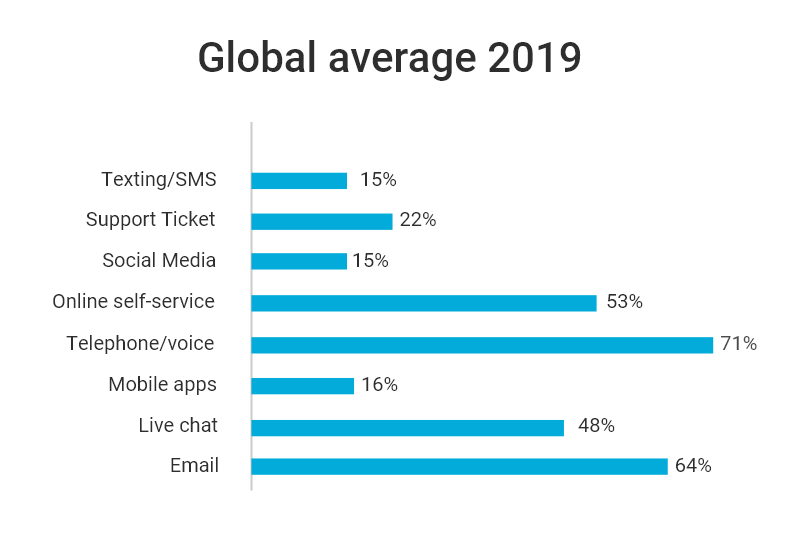
What is it: Phone or voice support is one of the oldest customer service channels. It lets you answer customer questions, provide technical support, handle complaints, and offer guidance and advice in real time.
How does it improve customer service:
? Solve Complex & Urgent Problems
Solve complex and urgent problems that require more explanation and clarification than other channels. This way, you can provide accurate and complete solutions to your customers and prevent frustration or dissatisfaction.
? Create Opportunities for Upselling & Cross-Selling
Create opportunities for upselling and cross-selling your products and services. This way, you can increase your revenue and customer lifetime value (CLV) by offering additional value and benefits to your customers.
2. Live Chat
What is it: Live chat is a customer service channel that involves using a chat widget or app to communicate with customers. Using live chat software, you can communicate with your website visitors in real time and help them with their queries.
How does it improve customer service: Professional live chat software like ProProfs Chat comes with various features that enhance customer service.
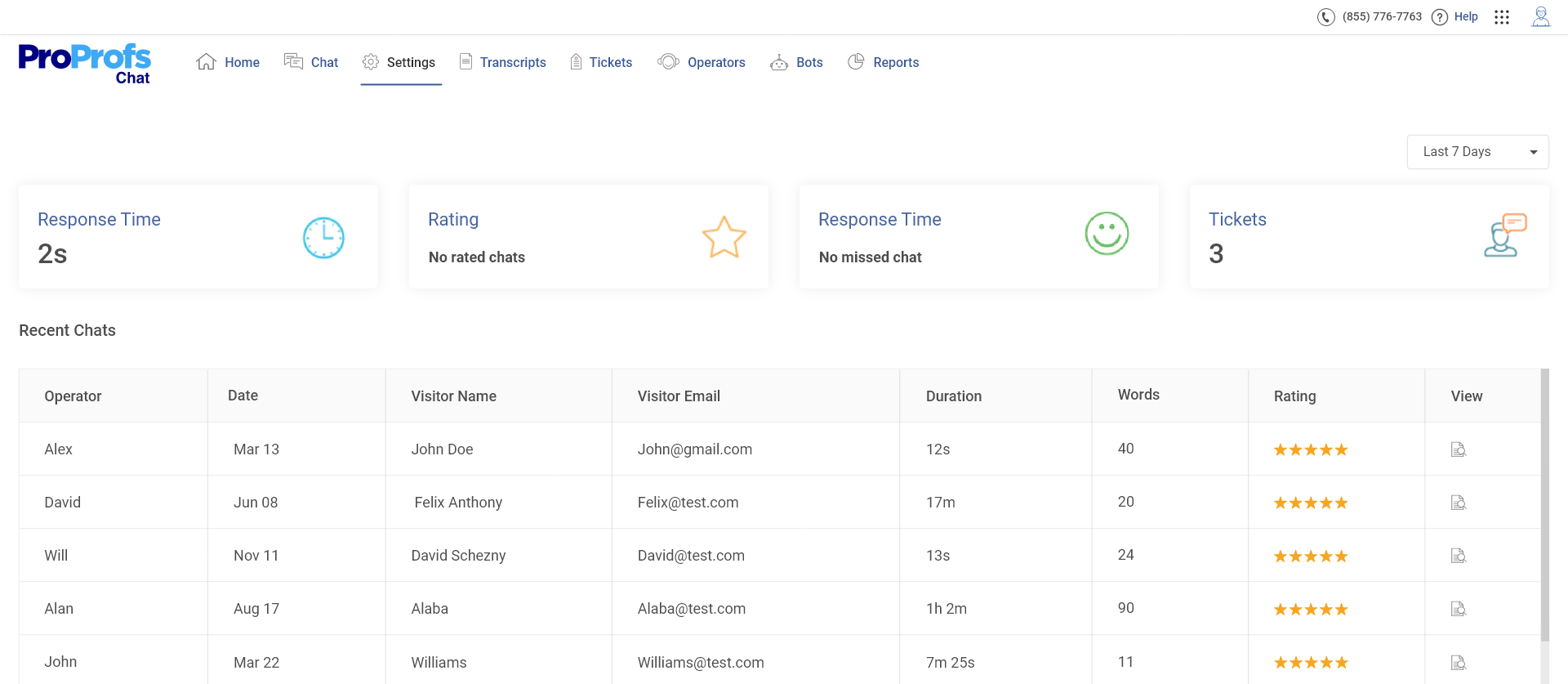
Here are some ways how –
? Automate Workflow With Chatbots
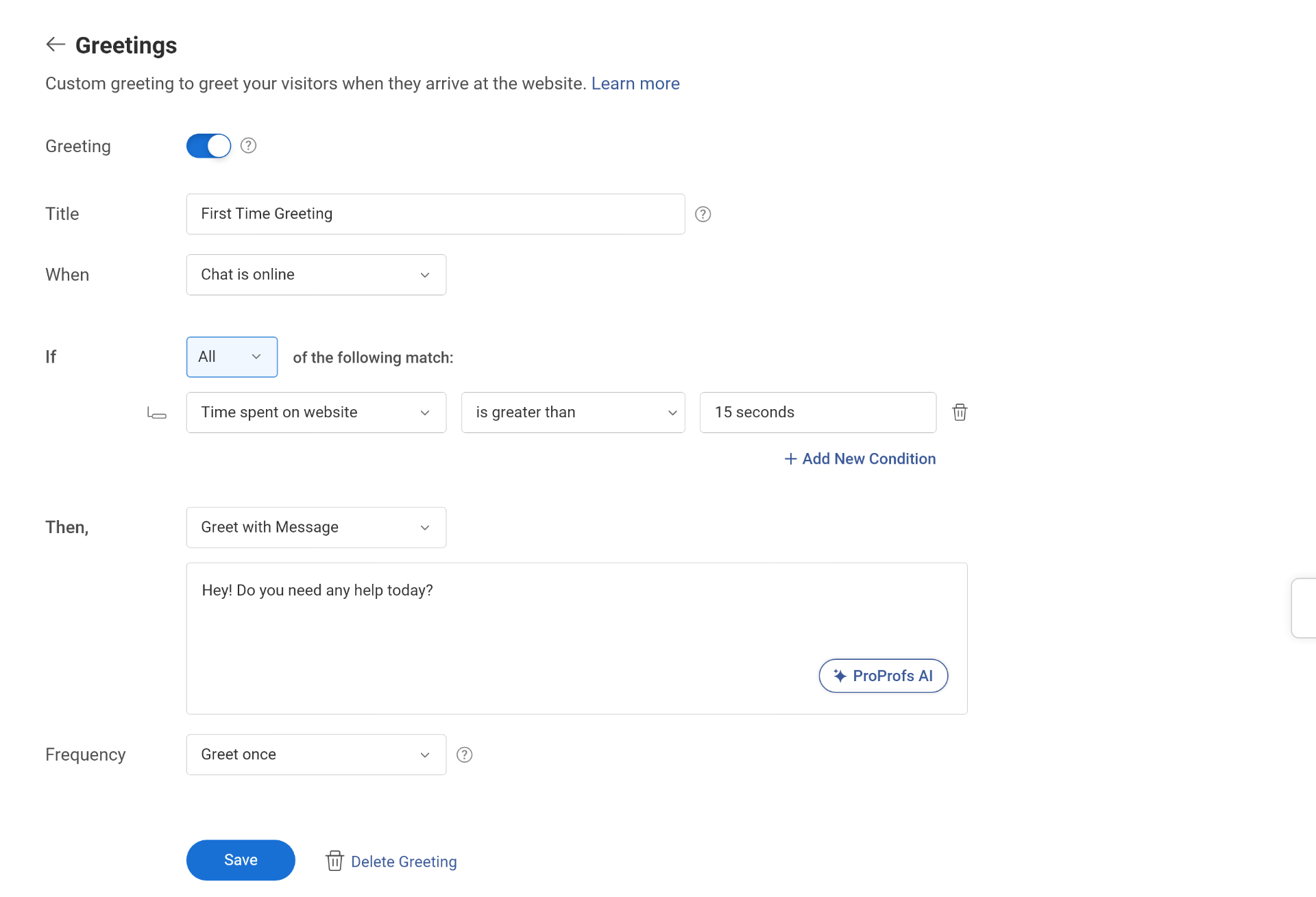
A chatbot is an automated program that can handle simple and repetitive tasks to reduce the workload of your human operators. They can automate customer support 24×7, create tickets, capture leads, greet customers, or book appointments.
? Extend Support With File Sharing
Live chat allows you to send and receive files, such as images, documents, or videos. This can help you provide more visual and detailed support to your customers.
? Provide Faster Responses With Pre-Written Messages
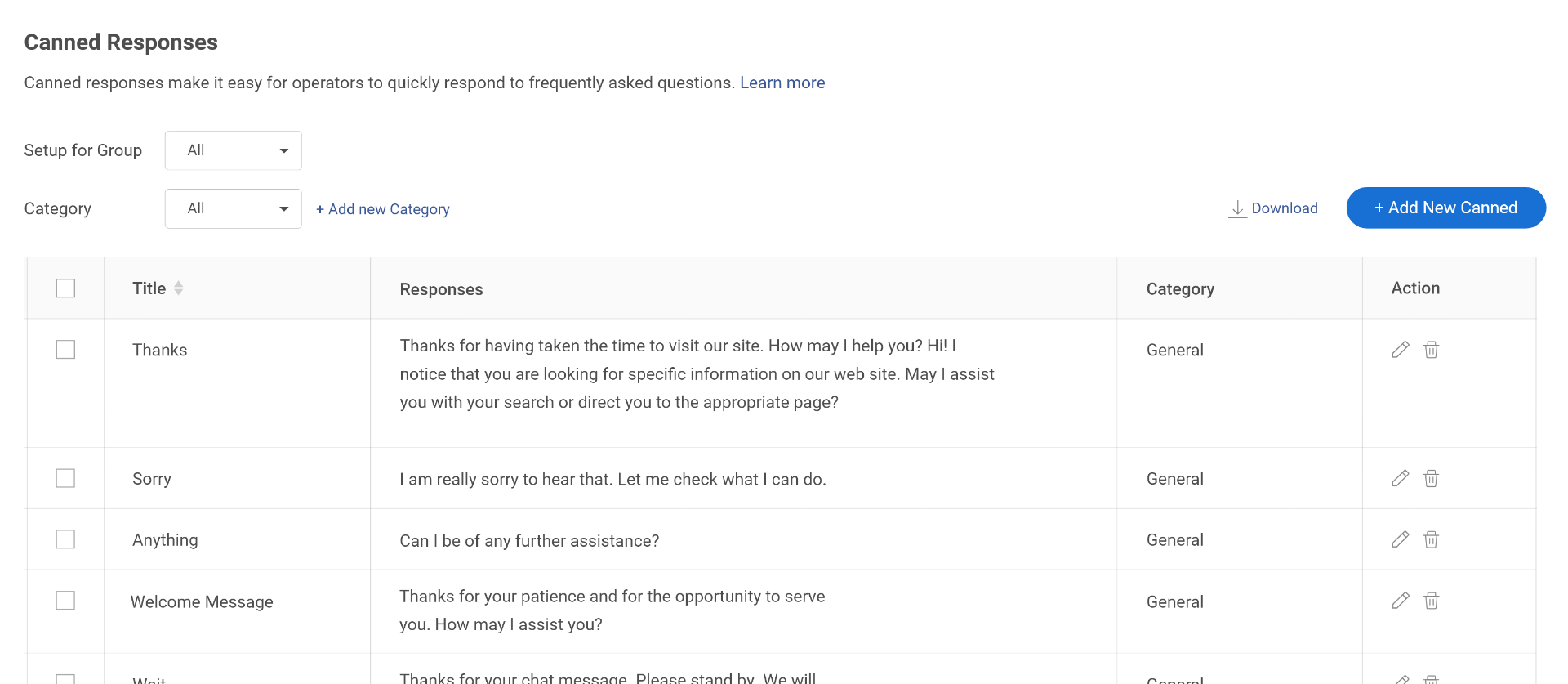
Canned responses are pre-written messages that you can use to reply to common questions or requests. These can help you reply to customers faster and maintain consistency in your communication.
Read More: Best Live Chat Software [In-Depth Comparison]
3. Knowledge Base
What is it: A knowledge base is a centralized repository of information about your products, services, and policies that facilitates self-service. It is a collection of articles, guides, FAQs, videos, and other content that explain how to use your products/services, how to solve common problems, etc.
A knowledge base can be accessed by your customers through your website, app, or chatbot. It can also be used by your support agents to quickly find and share relevant information with customers.
How does it improve customer service: A professional knowledge base software comes with various features that enhance your information management and delivery, including:
? Make Engaging Content
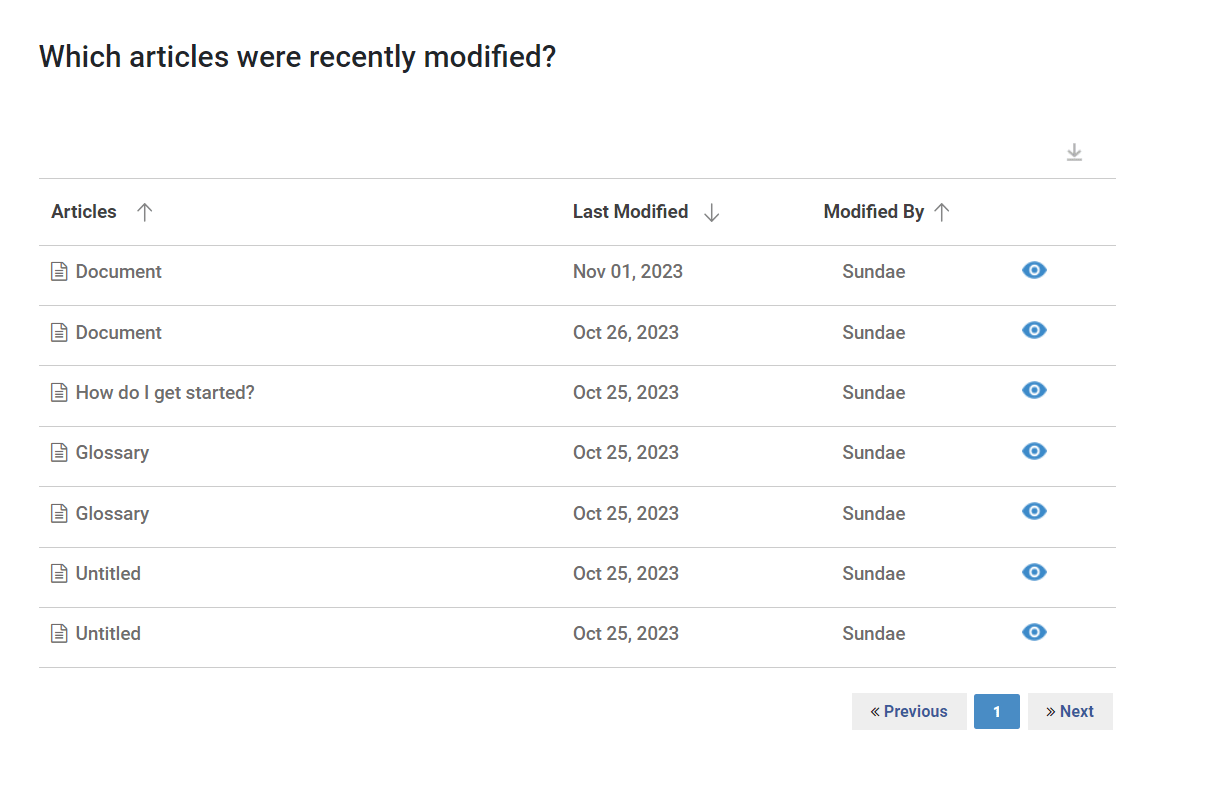
Create and edit articles, guides, FAQs, videos, etc., using a simple and intuitive editor. You can also use templates, formatting tools, images, links, etc., to make your content more engaging.
? Share Content Across Platforms
Publish and distribute your content to various channels and platforms, such as your website, app, social media, email, etc. You can use analytics and feedback tools to measure the impact of your content.
? Categorize Content for Easy Access
Categorize and structure your content according to topics, keywords, tags, etc. You can also use search and filter options to help your customers find the information they need quickly and easily.
Read More: Best Knowledge Base Software & Tools For Customer Service
4. Help Desk
What is it: A Help Desk is a software system used by support teams to keep track of customer queries and connect with them to provide assistance. A help desk can handle both internal and external requests from different channels, such as email, phone, chat, or social media.
With help desk software, you can organize customer conversations and provide fast and effective responses to their queries. You can also manage and resolve customer issues across various channels and platforms through a shared collaborative workspace.
How does it improve customer service:
? Ticket Management

Create, update, and close customer tickets from a shared inbox. You can also route tickets to the right agents, export tickets, use automation, etc., for faster resolution to customer issues.
? Multi-Channel Support
With multi-channel support, you can provide consistent and seamless customer service across multiple channels and platforms from a single dashboard. You can also integrate the help desk software with other tools and systems, such as CRM, live chat, survey maker, knowledge base, etc.
? Real-Time Chat
With real-time chat support, you can boost customer satisfaction and loyalty by answering their questions instantly. You can also automate ticket responses to reply to customers even before any agent starts working on them.
5. Email
By the end of 2025, email marketing is projected to generate nearly 11 billion in revenue.

Emails are widely used to send updates, confirmations, feedback requests, or support tickets in a timely and professional manner.
What is it: It is a customer service channel that lets you manage and respond to customer inquiries via email. It usually involves a dedicated email address, an email tracking tool, and a team of trained agents.
How does it improve customer service:
? Send Targeted Emails
Segment your audience based on criteria such as demographics, behavior, preferences, and purchase history. Targeted emails are personalized and, therefore, drive better engagement and increase conversion rates.
? Automate Email Workflows
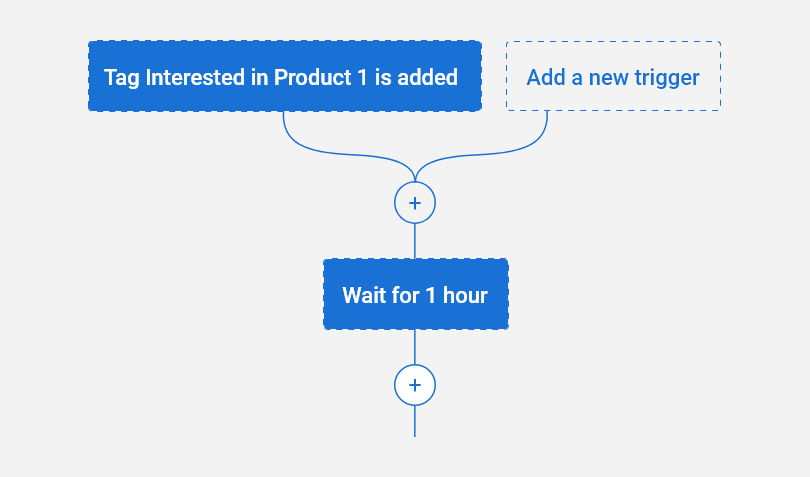
Automate your email workflows based on triggers, such as welcome emails, cart abandonment emails, feedback requests, and more. Sending timely and relevant information to your customers to keep them engaged throughout their customer journey.
? Email Analytics
Measure the performance of your email campaigns using metrics such as open rate, click-through rate, bounce rate, and conversion rate. You can also use A/B split testing to optimize your email elements, such as subject lines, images, and calls to action.
6. Social Media
According to a survey, 54% of people said they prefer companies that respond to customer service inquiries on social media.
Over the years, social media platforms like Facebook, Twitter, Instagram, and LinkedIn have become valuable tools for businesses to serve customers better.
What is it: Social media is a powerful customer service channel that empowers you to create and share valuable content, socialize, and interact with customers using text, images, videos, and audio. It helps you engage with a large and diverse audience, providing timely and relevant responses.
How does it improve customer service:
? Direct Communication
Directly communicate with customers through public or private social media channels. You can send messages, reply to their comments, or tweet to provide timely assistance.
? Real-Time Responsiveness
Unlike traditional customer service channels that have longer response times, social media allows for immediate interactions, leading to improved customer satisfaction.
? Customer Insights
By analyzing customer interactions on social media, you can gain a deeper understanding of customers, identify areas for improvement, and enhance products or services based on customer feedback.
Read More: Best Customer Service Channels to Improve Your Customer Experience
FREE. All Features. FOREVER!
Try our Forever FREE account with all premium features!
5 Customer Service Trends to Watch in 2025
As technology advances and customer behavior shifts, new trends emerge and transform the way businesses interact with their customers.
Explore the top 10 customer service trends that are likely to shape the customer service landscape in 2025 and beyond.
1. Artificial Intelligence (AI) & Automation
The global AI market is expected to grow steadily, recording a CAGR of 36.2% during 2022-2027.
AI and automation are already playing a significant role in customer service, and they will continue to do so in the near future.
AI can help businesses provide faster, smarter, and more personalized customer service by-
- Automating repetitive tasks such as answering FAQs, routing requests, or sending reminders.
- Enhancing self-service options such as chatbots, voice assistants, or knowledge bases to provide instant and accurate answers.
- Predicting customer behavior, identifying customer needs, or suggesting the next best actions.
- Augmenting human agents such as providing them with relevant information, guidance, or feedback.
Read More: What Is Automated Customer Service & Why It Is Important
2. Omnichannel Customer Service
Omnichannel customer service provides consistent and seamless support across multiple channels and devices.
Customers expect to be able to contact your business through their preferred channel, whether it is phone, email, live chat, social media, messaging apps, etc. They also expect to be able to switch between channels without losing context or quality.
By implementing omnichannel chatbot, you can elevate customer service by providing customers with more choice and control, increasing customer satisfaction and loyalty, and creating a consistent and seamless customer journey.
Read More: How to Establish The Ultimate Omni-Channel Customer Support System
3. Customer Experience (CX) Management
CX management is the process of designing, delivering, and measuring the overall experience that customers have with your business. It goes beyond customer service and encompasses every touchpoint and interaction that customers have with you throughout their journey.

CX management aims to –
- Create positive emotions that increase customer satisfaction, reduce stress, and build stronger emotional connections.
- Build trust to reduce customer churn and enhance customer referrals.
- Increase customer retention through feedback, referrals, or repeat purchases, thus reducing acquisition costs and enhancing customer lifetime value.
Integrating CX management in customer service lets you focus on the long-term relationship with customers rather than the short-term transaction.
Read More: Best Customer Experience Management Software & Tools
4. Analytics
Gartner reported that 84% of customer service and support leaders believe customer data and analytics will be “very or extremely important” for achieving organizational goals in 2025.
With advanced customer data analytics, you can:
- Understand customers’ needs, wants, preferences, behaviors, feedback, etc.
- Tailor your products, services, offers, communications, etc.
- Identify trends, patterns, opportunities, and challenges, etc. within the customer journey
- Improve existing customer service strategies and outcomes
5. Self-Service
Self-service support provides customers with the tools and resources to find answers or solutions to their questions or problems without contacting a human agent. Implementing it can help your business deliver more efficient customer service through-
- Online resources such as FAQs, knowledge bases, tutorials, or guides that can answer common or simple questions or issues.
- Chatbots or voice assistants to provide instant and accurate answers or solutions to more complex or specific questions or issues.
- Customer feedback or reviews that can provide insights or suggestions from other customers who have faced similar questions or issues.
By enabling self-service for customers, businesses can elevate their customer service by providing customers with more choice and control, increasing customer satisfaction, and improving customer service outcomes.
Read More: Customer Self-Service Portal: The Present & Future of Customer Support
Millennials vs. Gen Z: How is Customer Service Different for Each Generation?
Did you know that there are more than 68.6 million Gen Zs and 72.24 million millennials living in the US?
If you want to attract and retain them as your customers, you need to understand how they differ in their expectations and preferences for customer service.
Let’s explore the key differences between millennials and Gen Z when it comes to customer service and how you can tailor your strategy accordingly.
Communication Channels
Millennials grew up with the internet and social media, but they still value human interaction and personalization.
They prefer communicating with brands through email, phone, or live chat, and they expect fast and friendly responses. They also appreciate loyalty programs and rewards for their repeat purchases.
Gen Z, on the other hand, is the first generation of digital natives who are used to instant gratification and multitasking.
They prefer to communicate with brands through text, messaging apps, or social media platforms, and they expect quick and concise answers. They also value authenticity and transparency over loyalty and incentives.
? Pro Tip
How do you talk to them the way they want to be talked to? Simple. Offer them multiple communication channels and let them choose their favorite one.
Read More: Customer Communication Tools For Positive Interactions
Feedback & Reviews
According to a survey, 89% of customers aged between 18-34 are eager to provide feedback.

Millennials are more likely to share their feedback with brands and other customers online.
They trust online reviews as much as personal recommendations and use them to make informed decisions. Moreover, they expect brands to respond to their feedback and address their issues.
On the other hand, Gen Z is less likely to share their feedback and reviews online but is more likely to read them.
They trust online reviews more than recommendations and use them to compare options and find the best deals.
Self-Service Options
Did you know that 86% of your consumers expect an online self-service option from your company?

Millennials are comfortable with using self-service options such as FAQs, knowledge bases, or chatbots.
They appreciate the convenience and efficiency of self-service options, but they also want the option to escalate to a human agent if needed.
Gen Z is more dependent on using self-service options than millennials.
They prefer to find answers or solutions on their own without having to contact a brand or wait for a response. They value the speed and simplicity of self-service options, but they also want them to be accurate and reliable.
Personalization
Millennials are used to receiving personalized offers and recommendations from brands based on their browsing history, purchase behavior, or preferences.
They appreciate the relevance and convenience of personalization and customization, but they also value their privacy and security.
Gen Z is more demanding of personalization and customization than millennials.
They want brands to know them better than they know themselves and to offer them products or services that match their unique needs, wants, or interests. They also value their privacy and security, but they are more willing to share their data in exchange for better experiences.
Revamp Your Customer Service With a Proactive Solution
Customer service is not a one-time thing. It’s a journey.
It’s about being transparent, empathetic, and proactive when things go wrong. Furthermore, it is also about understanding how every customer is unique and that there is no one-size-fits-all solution.
So, how do you achieve all this without breaking a sweat or hiring an army of agents?
The answer is simple: with effective customer service tools.
To get off the mark, you can try ProProfs’ Chat – a completely free-to-use software packed with live chat and AI chatbot features.
It is an easy-to-use application that lets you chat with customers in real time, set automated greetings, gather their feedback, gather leads, and gain detailed ideas about your team’s performance from analytics and reports.
FAQs
1. Is customer service a skill?
Yes, customer service is a skill that encompasses effective communication, problem-solving, and the ability to provide satisfactory solutions to customers’ needs and concerns.
2. What are the 3 qualities of good customer service?
The three qualities of good customer service are responsiveness, empathy, and competence.
- Responsiveness: Good customer service involves promptly addressing customer concerns.
- Empathy: It is crucial to understand and relate to your customer’s emotions and experience and show genuine concern to create a positive interaction.
- Competence: Customer service representatives should possess the knowledge, skills, and expertise required to assist customers effectively.
3. What are some common customer service challenges and how to overcome them?
Customer service challenges can vary depending on the industry and specific circumstances, but here are some common challenges and strategies to overcome them-
- Train representatives to overcome language and cultural barriers.
- Handle difficult customers with active listening, empathy, de-escalation, and solution-oriented approaches.
- Utilize chat routing and self-service options to minimize delays.
- Invest in comprehensive training, easy access to updated information, and promote ongoing learning for operators.
- Adapt to changing customer expectations by collecting feedback, monitoring trends, and making improvements accordingly.
4. What is the role of effective communication in customer service?
Effective communication is the foundation for building strong relationships with your customers and ensuring their satisfaction. Here are some key aspects of its role in customer service-
1. Understanding Customer Needs: Effective communication allows you to actively listen to your customers, understand their requirements, and provide appropriate solutions..
2. Clear and Concise Information: Clear and concise communication ensures that customers stay updated with policies, updates, and more.
3. Building Trust: Active listening, prompt responses, and accurate information show value and build trust.
4. Feedback and Improvement: Improve customer service by actively seeking feedback through surveys, follow-up calls, and online reviews.
5. What is the impact of customer service on customer loyalty and retention?
- Exceptional customer service builds trust and satisfaction, making customers feel valued and appreciated.
- It enhances the overall customer experience by exceeding expectations and providing personalized support.
- Satisfied customers providing word-of-mouth recommendations can have a significant impact on customer acquisition and retention.
- Excellent customer service fosters loyalty, emotional connection, repeat business, and brand ambassadorship, leading to increased customer retention and higher customer lifetime value.
6. How can businesses utilize technology to enhance their customer service?
- Using Free AI-powered chatbots to answer common questions and requests from customers quickly and personally.
- Leveraging sentiment analysis to detect customer emotions and adjust responses or escalate to human agents accordingly.
- Using natural language processing (NLP) to understand customer queries and provide accurate solutions.
- Utilizing machine learning to tailor customer experience based on their preferences, behavior, and history and offer personalized recommendations, offers, or solutions.
 Tips
Tips
We’d love to hear your tips & suggestions on this article!
FREE. All Features. FOREVER!
Try our Forever FREE account with all premium features!


 We'd love your feedback!
We'd love your feedback! Thanks for your feedback!
Thanks for your feedback!







